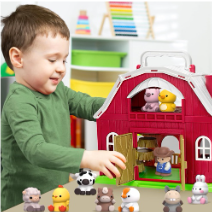Go-To Toys to Promote Language Development
Abby Moran, CCC-SLP
Building Toys: Building toys can be used for a wide variety of activities. They’re great for both early language in young children and older children working on more advanced language skills. For children with more advanced play skills, it’s easy to incorporate other items such as cars, dollhouse figurines, or animals to encourage pretend play.
Blocks or Magnet Tiles
Target Skills:
spatial concepts/prepositional concepts (on top, next to, etc.)
requesting help
environmental/exclamatory sounds (e.g., oh no! crash! boom!)
turn-taking
combing single words to form short phrases (e.g., blue on, on top, my turn/your turn)
Nesting/Stacking Toys
Target Skills:
spatial concepts/prepositional concepts (e.g., in, out, on top, behind, next to, etc.)
basic size concepts (big/little) or expanding on basic size concepts to teach more advanced vocabulary (giant/huge, tiny/small, tall/short, etc.)
following directions
combining single words to form short phrases (e.g., puppy in/out/on, on top, fall down, hi/bye puppy, etc.)
exclamatory/environmental sounds (e.g., animal sounds, crash!, oh no, wow!)
Open-ended Toys: Open-ended toys are wonderful tools because they can be adapted as your child makes progress, meets their goals, and continues to grow in their communication skills. Open-ended toys are great for a variety of ages and for addressing countless skills. Finally, this type of toy is great for encouraging more advanced play skills, such as pretend play.
Barn & Farm Animal Figurines
Target Skills:
environmental sounds (animal sounds, exclamatory sounds)
vocabulary development
language expansion/combining single words to form phrases (hi cow, cow up/down, cow in/out, etc.)
practicing pretend play
encouraging shared engagement/joint attention by incorporating songs such as Old McDonald
Pretend Play Food/Kitchen
Target Skills:
environmental sounds (ding, mmm, yucky, etc.)
requesting practice
vocabulary building
encouraging pretend play
language expansion/combining single words to form phrases (yummy pizza, more pizza, hot pizza, eat pizza, open door, water on/off, etc.)
applicable to real-word scenarios during mealtime/feeding routines
Cause-And-Effect Toys: Understanding cause and effect while interacting with a toy or activity is a necessary prelinguistic skill as children learn that their actions or words have an impact on others and their environment. As babies, infants learn that crying or vocalizing results in a bottle, diaper change, being picked up, etc. As infants develop, babies learn that different vocalizations result in different actions, which eventually leads to development of words. Turn-taking can also be easily incorporated into many activities involving cause-and- effect toys. Taking turns during play is an essential prelinguistic skill because it teaches reciprocal interactions similar to back-and-forth conversational turn-taking.
Ball & Hammer Toy
Target Skills:
vocabulary development
requesting
language expansion/combining single words to form phrases (ball up/down, red/blue/green ball, etc.)
environmental sounds (weee, tap tap tap)
turn-taking/reciprocal interactions
Pop-Up Toys
Target Skills:
vocabulary development (twist, push, slide)
requesting help
environmental sounds (pop, wow, etc.)
language expansion/combining single words to form phrases (hi/bye monkey, monkey, hide monkey, found you, push red/blue/yellow, etc.)
turn-taking/reciprocal interactions
Remember: While these toys are fantastic tools, YOU, as the caregiver, are the most powerful asset when it comes to promoting language development. So, have fun together! Always prioritize shared joy and shared engagement while playing with your child. Model simple language throughout the activity, be silly, and sing songs. The more fun the child has, the more likely they are to engage with you, engage in the activity, and explore language on their own. Finally, be patient and encouraging. Language skills take time to develop; children often need lots of repetition in order to acquire an understanding of a given skill, so celebrate even the seemingly small victories!







